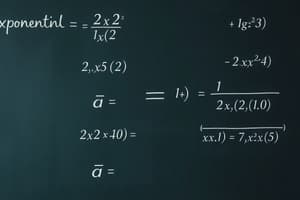Podcast
Questions and Answers
What is the domain of the function $f(x) = [e^{1-x}] log_a x$?
What is the domain of the function $f(x) = [e^{1-x}] log_a x$?
- $[0, 1]$
- $(1, 3)$
- $[1, 3]$ (correct)
- $[1, rac{3}{2}]$
Which component of the function $f(x)$ involves an exponential expression?
Which component of the function $f(x)$ involves an exponential expression?
- $log_a x$
- $e^{1-x}$ (correct)
- $f(x)$ itself
- None of the above
What happens to $f(x)$ as $x$ approaches 1 from the right?
What happens to $f(x)$ as $x$ approaches 1 from the right?
- $f(x)$ remains constant
- $f(x)$ approaches $0$
- $f(x)$ approaches infinity
- $f(x)$ approaches $e^0$ (correct)
If $a > 1$, what can be inferred about $log_a x$ for $x$ in $[1, 3]$?
If $a > 1$, what can be inferred about $log_a x$ for $x$ in $[1, 3]$?
What is likely true about the behavior of $f(x)$ as $x$ increases from 1 to 3?
What is likely true about the behavior of $f(x)$ as $x$ increases from 1 to 3?
Flashcards are hidden until you start studying
Study Notes
Domain of the Function
- The function ( f(x) = [e^{1-x}] \log_a x ) is defined for ( x > 0 ) due to the logarithm term ( \log_a x ).
- Additionally, ( \log_a x ) must be defined, which excludes ( x = 0 ).
Exponential Component
- The component ( e^{1-x} ) is the exponential expression within the function ( f(x) ).
- This expression is defined for all real numbers, and its value approaches 1 as ( x ) approaches 1.
Behavior as ( x ) Approaches 1 from the Right
- As ( x ) approaches 1 from the right (( x \to 1^+ )), ( \log_a x ) approaches 0, causing ( f(x) ) to approach 0 as well.
- The exponential term ( e^{1-x} ) approaches ( e^0 = 1 ).
Implications of ( a > 1 )
- For ( a > 1 ), the logarithmic function ( \log_a x ) is positive in the interval ( [1, 3] ) since it increases from 0 to a positive value.
- Therefore, ( \log_a x > 0 ) for all ( x ) in ( (1, 3) ).
Behavior of ( f(x) ) from 1 to 3
- As ( x ) increases from 1 to 3, ( \log_a x ) increases while ( e^{1-x} ) decreases.
- The overall behavior of ( f(x) ) indicates a combination of these effects, with ( f(x) ) initially approaching 0 and then possibly increasing, depending on the relative growth rates of ( e^{1-x} ) and ( \log_a x ).
Studying That Suits You
Use AI to generate personalized quizzes and flashcards to suit your learning preferences.




